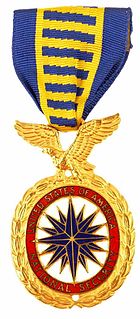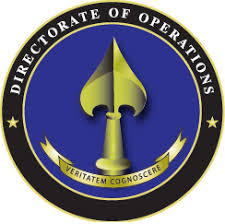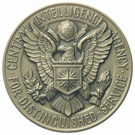
This list of intelligence and espionage-related awards and decorations is an index to articles about notable awards and decorations related to intelligence and espionage.

This list of intelligence and espionage-related awards and decorations is an index to articles about notable awards and decorations related to intelligence and espionage.
The United States Intelligence Community is a group of separate United States government intelligence agencies and subordinate organizations, that work separately and together to conduct intelligence activities to support the foreign policy and national security of the United States.
| Award | Description |
|---|---|
| National Intelligence Medal of Achievement | For significant acts of service to the community as a whole. Replaced with the National Intelligence Exceptional Achievement Medal in 2012 [5] |
| National Intelligence Cross | To United States government civilian or military personnel who have gone above and beyond the call of duty in response to a threat to national security [6] |
| National Intelligence Distinguished Public Service Medal | Individuals who rendered extraordinary service at considerable personal sacrifice and who were motivated by patriotism, good citizenship or a sense of public responsibility [7] |
| National Intelligence Distinguished Service Medal | Any member or contributor to the National Intelligence Community, either civilian or military, who distinguishes themselves by meritorious actions to the betterment of national security in the United States of America, through sustained and selfless service of the highest order [8] |
| National Intelligence Meritorious Unit Citation | For the collective performance of a unit or group that has resulted in accomplishments of a clearly superior nature and of significant benefit to the Intelligence Community [9] |
| National Intelligence Exceptional Achievement Medal | In recognition for creditable service or contributions to the Intelligence Community and the United States |
| National Intelligence Medal for Valor | To acknowledge the exceptional and unrecognized accomplishments of members of the Intelligence Community |
| National Intelligence Reform Medal | Recognizes extraordinary service in implementing the Intelligence Reform and Terrorism Prevention Act |
| National Intelligence Superior Service Medal | Recognizes an individual's superior service or a lasting contribution over a long period of time to the United States Intelligence Community and the United States as a whole |
The Central Intelligence Agency (CIA) is a civilian foreign intelligence service of the federal government of the United States, tasked with gathering, processing, and analyzing national security information from around the world, primarily through the use of human intelligence (HUMINT)
| Award | Description |
|---|---|
| Agency Seal Medal | Awarded by the CIA to non-Agency personnel, including U.S. Government employees and private citizens, who have made significant contributions to the Agency's intelligence efforts |
| Career Commendation Medal | For exemplary service significantly above normal duties that had an important contribution to the Agency's mission |
| Career Intelligence Medal | For a cumulative record of service which reflects exceptional achievements that substantially contributed to the mission of the Agency |
| Distinguished Career Intelligence Medal | For an individual's cumulative record of service reflecting a pattern of increasing levels of responsibility or increasingly strategic impact and with distinctly exceptional achievements that constitute a major contribution to the mission of the Agency |
| Distinguished Intelligence Cross | For a voluntary act or acts of extraordinary heroism involving the acceptance of existing dangers with conspicuous fortitude and exemplary courage |
| Distinguished Intelligence Medal | For performance of outstanding services or for achievement of a distinctly exceptional nature in a duty or responsibility |
| Exceptional Service Medallion | In recognition of an employee's injury or death resulting from service in a hazardous area |
| Hostile Action Service Medal | For direct exposure to a specific life-threatening incident in the foreign field or in the U.S. where the employee was in close proximity to death or injury, but survived and sustained no injuries |
| Intelligence Commendation Medal | For performance of especially commendable service or for an act or achievement significantly above normal duties which results in an important contribution to the mission of the Agency |
| Intelligence Medal of Merit | For performance of especially meritorious service or for achievement conspicuously above normal duties |
| Intelligence Star | For voluntary acts of courage performed under hazardous conditions or for outstanding achievements or services rendered with distinction under conditions of grave risk |
| Kathy Stewart Award | Honors an employee who reflects the highest standards of dedication to service, commitment to the rule of the law and genuine caring for others |
Espionage, spying or intelligence gathering is the act of obtaining secret or confidential information (intelligence) from non-disclosed sources or divulging of the same without the permission of the holder of the information for a tangible benefit. A person who commits espionage is called an espionage agent or spy. Any individual or spy ring, in the service of a government, company, criminal organization, or independent operation, can commit espionage. The practice is clandestine, as it is by definition unwelcome. In some circumstances, it may be a legal tool of law enforcement and in others, it may be illegal and punishable by law.

The Defense Intelligence Agency (DIA) is an intelligence agency and combat support agency of the United States federal government, specializing in defense and military intelligence.

The National Security Medal is a decoration of the United States of America officially established by President Harry S. Truman in Executive Order 10431 of January 19, 1953. The medal was originally awarded to any person, without regard to nationality, for distinguished achievement or outstanding contribution on or after July 26, 1947, in the field of intelligence relating to the national security of the United States.

The Foreign Intelligence Service of the Russian Federation or SVR RF is Russia's external intelligence agency, focusing mainly on civilian affairs. The SVR RF succeeded the First Chief Directorate (PGU) of the KGB in December 1991. The SVR has its headquarters in the Yasenevo District of Moscow.

The National Intelligence Distinguished Service Medal (NIDSM) is a decoration awarded for service to the United States Intelligence Community. The decoration is awarded to any member or contributor to the National Intelligence Community, either civilian or military, who distinguishes themselves by meritorious actions to the betterment of national security in the United States of America, through sustained and selfless service of the highest order.
The National Intelligence Authority (NIA) was the United States Government authority responsible for monitoring the Central Intelligence Group (CIG), the successor intelligence agency of the Office of Strategic Services established by President Harry S. Truman's presidential directive of 22 January 1946 in the aftermath of World War II. The National Intelligence Authority and Central Intelligence Group were both replaced respectively by the National Security Council and the Central Intelligence Agency under the National Security Act of 1947, which was implemented on 18 September 1947.

Lieutenant General Samuel Vaughan Wilson, aka "General Sam", completed his active military career in the fall of 1977, having divided his service almost equally between special operations and intelligence assignments. He served as President of Hampden-Sydney College from 1992–2000 and as Director of the Defense Intelligence Agency from May 1976-August 1977; for his foundational work in doctrine for low intensity conflict, where he coined the term "counterinsurgency" (COIN); and for facilitating the drafting and passage of the Nunn-Cohen Amendment to the 1987 Defense Authorization Act, effectively creating the US Special Operations Command (USSOCOM) and the Office of the Assistant Secretary of Defense for Special Operations and Low Intensity Conflict (ASD/SOLIC). He is also credited with helping to create Delta Force, the U.S. Army's premier counterterrorism unit.
Awards and decorations of the United States government are civilian awards of the U.S. federal government which are typically issued for sustained meritorious service, in a civilian capacity, while serving in the U.S. federal government. Certain U.S. government awards may also be issued to military personnel of the United States Armed Forces and be worn in conjunction with awards and decorations of the United States military. In order of precedence, those U.S. non-military awards and decorations authorized for wear are worn after U.S. military personal decorations and unit awards and before U.S. military campaign and service awards.

The Directorate of Operations (DO), less formally called the Clandestine Service, is a component of the US Central Intelligence Agency. It was known as the Directorate of Plans from 1951 to 1973; as the Directorate of Operations from 1973 to 2005; and as the National Clandestine Service (NCS) from 2005 to 2015.

William Joseph Burns is an American diplomat and career ambassador serving as the director of the Central Intelligence Agency since March 19, 2021. He previously served as the United States deputy secretary of state from 2011 to 2014. He retired from the US Foreign Service in 2014 after a 32-year diplomatic career. From 2014 to 2021, he served as president of the Carnegie Endowment for International Peace.

The Distinguished Intelligence Medal is awarded by the U.S. Central Intelligence Agency for performance of outstanding services or for achievement of a distinctly exceptional nature in a duty or responsibility.
The Distinguished Intelligence Cross is the highest decoration awarded by the United States Central Intelligence Agency. It is the agency's equivalent of the military's Medal of Honor or Service Cross, i.e., Navy Cross, Army Distinguished Service Cross, Air Force Cross. It has been said that the DIC is the equivalent to the Medal of Honor, but the MOH is awarded by the president of the United States in the name of the U.S. Congress and the DIC is awarded by the CIA.
The National Intelligence Medal of Achievement is an award that was presented to members of the United States Intelligence Community, both civilian and military, to recognize significant acts of service to the community as a whole. The National Intelligence Medal of Achievement was replaced with the equivalent National Intelligence Exceptional Achievement Medal, during the restructuring of the National Intelligence Community Awards (NICA) Program, with the revision of Intelligence Community Directive 655 in 2012.
The Intelligence Medal of Merit is awarded by the Central Intelligence Agency for performance of especially meritorious service or for achievement conspicuously above normal duties.

The Sam Adams Award is given annually to an intelligence professional who has taken a stand for integrity and ethics. The Award is granted by the Sam Adams Associates for Integrity in Intelligence, a group of retired CIA officers. It is named after Samuel A. Adams, a CIA whistleblower during the Vietnam War, and takes the physical form of a "corner-brightener candlestick".

Enno Henry Knoche was an American intelligence officer who served as deputy director of the CIA and acting Director of Central Intelligence.

The National Intelligence Cross is a decoration of the United States Intelligence Community (IC) awarded under the National Intelligence Awards (NIA) Program by the Office of the Director of National Intelligence (ODNI). It is the highest award presented by the Office of the Director of National Intelligence. It is equivalent of the Central Intelligence Agency's Distinguished Intelligence Cross.
The National Intelligence Reform Medal is an award of the United States Intelligence Community's National Intelligence Awards Program that recognizes extraordinary service in implementing the Intelligence Reform and Terrorism Prevention Act. The medal ranks below the National Intelligence Superior Service Medal, but above the National Intelligence Exceptional Achievement Medal. Established 23 May 2007 with the creation of the National Intelligence Awards Program, it was retired in November 2010.

Joanne O'Rourke Isham is espionage and security expert from the United States. She is a former member of the Central Intelligence Agency (CIA) and currently involved in geospatial intelligence.

James C. King is a retired United States Army Lieutenant General. A career Military Intelligence officer, he served on active duty from 1968 to 2001. At the time of his retirement he was serving as the Director of the National Imagery and Mapping Agency, one of the intelligence agencies of the United States Intelligence Community.
{{cite web}}: External link in |work=